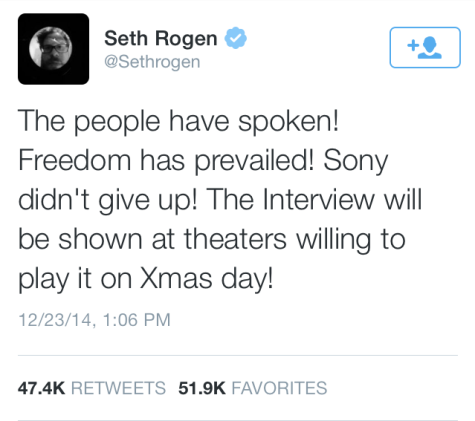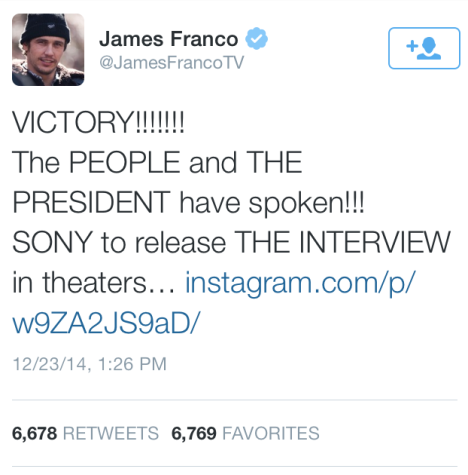A questionable controversy
The Interview movie was among a whirlwind of debate during the winter holiday

Amid the crazy holiday shopping season and swirling question of snow, another topic was emblazoned in the minds of students during December. The looming question of whether the recently newsworthy movie, The Interview, which depicts actors Seth Rogen and James Franco on a mission to assassinate North Korean leader Kim Jong Un, would be played in theaters on Christmas day had everyone wondering. From the beginning, when Un said he would be watching, to its release on the internet and On Demand among threats of attack, the timeline of the movie’s life is not a typical one.
The Hype
When the movie was set to release in December, controversy surrounded the topic, but no one believed it would escalate to a threat. Franco and Seth Rogen, made appearances and promoted their movie like any other picture. However, the movie’s sensitive topic made it a conversation topic worldwide, and had Sony, the maker of the movie, as well as viewers, on the edge of their seats as they waited to see how it would be handled by the Sony Corporation, by the government, by anyone. But sophomore Kevin Morales saw the movie because of the news coverage, “I just thought of it as a regular comedy movie,” he said. The increased coverage launched the movie not only into the national spotlight, but the world’s, and came under much scrutiny.
The Sony Hack
On Dec. 16, Sony received threats from online hackers. These hackers left messages insinuating that there would be an attack on any American theater that dared show the film. This sent the company and public into a sort of panic, as mall owners pleaded with theaters not to screen the movie for fear of scared customers during the busiest shopping season of the year. Theaters around the country were told they could use their discretion regarding its release, with many, including Regal Cinemas, yanking it from their sites. Freshman Caroline Koon saw the news about the hack and decided to take it seriously. “Me and my mom really wanted to see it, but I was scared at first. I didn’t want them to attack us,” she said. This fear was not akin to just Koon; Americans all over the country rethought their plans for Christmas day, for others, however, the hack brought the movie to light and sparked an interest in a number of people. “I didn’t even know about the movie until the hacks, and it became such big news and it gave it more attention,” said senior Farbod Mogahaddam.
Pulling the movie from theaters
After the threats were made, and certain theaters decided to pull the film from its screens, Sony Pictures officially decided not to release the movie in theaters on Christmas. This incited a national protest, as people from all over the country discussed the decision. Even the President of the United States issued a statement, calling the cancellation a “mistake”. In a statement to the press, President Obama affirmed “I would have told them, ’Do not get into a pattern in which you’re intimidated by these kinds of criminal attacks.” “That’s not who we are,” he said. “That’s not what America’s about.”
The action behind it was somewhat justified; however, some argued. Junior Mary Offut agrees with that idea, adding “I could see why they did that, just because of what the topic of the movie was.”
 The Release
The Release
After President Obama’s statement, as well as many other persuading factors, Sony agreed to release the film to any theaters that wished to show it, as well as making it available On Demand in people’s homes, so that they may watch it wherever they are. The film also became accessible on the net for free, where people watched it from illegal pirating websites, spreading the film and gaining it much more popularity than it would have from strictly just being in the theater. Koon and Morales both watched the movie On Demand, Koon admitting that she felt a lot safer watching the controversial movie in the safety of her house.

